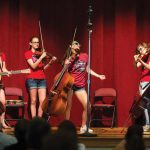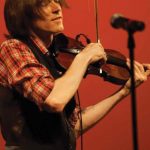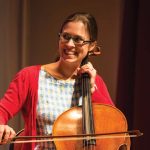Music is a conversation that transcends all languages, according to Darol Anger, legendary fiddler, composer, producer and educator – and one of the best-known of a dozen nationally-recognized musicians teaching and performing at Vero’s upcoming Mike Block String Camp.
As Anger puts it, “Music is a story told in a language that doesn’t involve words, although there might be words riding on top of the music.”
Anger, an icon in the fiddle world, will be having “conversations” with his contemporaries in Vero Beach next month during the Vero Beach International Music Festival, the performance dimension of the two-week long Mike Block String Camp. Anger will perform in the second of two free concerts given by the faculty and students. Both concerts, as well as the all-ages summer camp, take place at First Presbyterian Church.
Anger’s Republic of Strings and Turtle Island String Quartet are two of the best-known groups of the folk/Americana genre. Anger has played with contemporary bluegrass and legendary folk musicians David Grisman, Bill Frisell, Bela Fleck and Edgar Meyer, among others.
Since 2010, the Mike Block String Camp has evolved into an incubator teeming with talent and creativity with a focus on the cultivation of music collaboration. An impressive lineup of world-class musicians from around the country gathers in Vero Beach each summer to work with students during two weeks of intensive improvisational string playing and vocals. The staff jam sessions, a natural byproduct of the camp, evolved into the annual Vero Beach International Music Festival.
If that sounds grand-scale, it is; Block, the camp’s creator, directs Yo-yo Ma’s Silkroad Global Music Project.
“We want people to make creative decisions and find their own identity in music,” says Block. “What we do at camp is largely through collaboration while drawing on existing musical traditions of various kinds.
“At the end of it, we’re asking the students to find their own creative voice.”
Block grew up playing classical music and then discovered how much fun it was to play music of all different styles. “Even though I didn’t grow up in the southern United States, I could still play bluegrass. I didn’t grow up in New York City, but I could still play jazz. I think a big part of what we are trying to do is expose people to all the different kinds of music that they can find themselves in.”
“These camps aren’t new,” says Anger. “Musicians have been getting together to jam for generations. It’s like a big semi-functional family. And the caliber of musicians, both professionals, and students is beyond belief.”
That is not an exaggeration, past audiences will attest. “You need to play with people who are very interested in what you have to say and will say something extremely interesting back to you,” says Anger. “This constant flow of ideas sparks thoughts because you become more interesting if you’re with an interesting person.”
America’s traditional music – more than any other art of our culture – is the one place this melting pot idea works creating a miasma of cultural music, according to Anger. He first fell in love with music because of the Beatles and started playing guitar when he was about 8 years old. One day he saw a man playing violin in a restaurant and thought it looked like a lot more fun than the guitar. When a friend gave a violin to his family, Anger decided to give it a try.
At 14, Anger discovered much more in the world of music. Living in the San Francisco Bay Area, he was exposed to an exciting range of cultural events, and while classical music was among the offerings, it was not to be his focus. “I was ruined from playing any kind of pure form by starting out with the Beatles. They drew from everything.”
Anger attended college but dropped out to focus on his music. “It was right when bluegrass was big. I was very attracted to the work of American violinist Richard Greene and blues musician Taj Mahal, all these people that were living in the area. I would go to concerts and hang out. I’d play these venues as opening acts.”
That’s the key for a budding musician, says Anger. “Go where the musicians are. If you’re living in Omaha, Nebraska, it will be difficult. You can always go back there and spread your music around.
But you need to be in Nashville, Boston or Austin. You need to go to music camps. You don’t have to go to college to learn about music, but you do have to be where the people that are studying music are. You need that interaction.”
Anger has no shortage of work. He’s an associate professor at Berklee College of Music in Boston, the largest independent college of contemporary music in the world. He also has his online fiddle school. And he tours, especially in the summer when there are music camps and festivals. “For most musicians who travel to play a concert, it’s like you get fired every time you do a job. Then you get rehired at the next job,” says Anger with a chuckle.
The festival includes five free public performances at First Presbyterian and includes an award-winning lineup with champion fiddlers and musicians that have performed with greats like the late Jerry Garcia and Yo-Yo Ma.
The concerts all take place in First Presbyterian’s music building, at 520 Royal Palm Blvd., just off Indian River Boulevard, south of the Barber Bridge. Suggested donations go toward the string camp scholarship fund.
- July 5 at 7:30 p.m. Main Stage Performances featuring Americana, Bluegrass, Brazilian, Celtic, Folk, Jazz, Pop, Rock and more with Mike Block, Zach Brock, Hanneke Cassel, Colin Cotter, Joe Craven, Brittany Haas, Natalie Haas, Taylor Morris, Lauren Rioux and Kai Welch. ($20 suggested donation.)
- July 8 at 3 p.m. Student Concert & Barn Dance featuring participants from the Mike Block String Camp. ($10 suggested donation).
- July 12 at 7:30 p.m. Main Stage Performances featuring Americana, Bluegrass, Brazilian, Celtic, Folk, Jazz, Pop, Rock, and more with Darol Anger, Mike Block, Hanneke Cassel, Courtney Hartman, Greg Liszt, Kimber Ludiker and Joe Walsh. ($20 suggested donation).
- July 13 and 14 at 7:30 p.m. Featuring faculty-led advanced student bands. ($10 suggested donation).
To learn more about the performers, visit VeroBeachInternationalMusicFestival.com.
- Mike Block String Camp students
- Zach Brock
- Natalie Haas
- Britanny Haas







